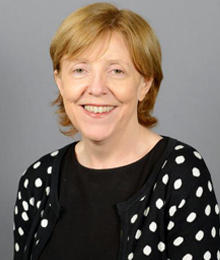An interview with Professor Evelyn Doyle
December 2019
Professor Evelyn Doyle is based at University College Dublin in the School of Biology and Environmental Science. Her research focuses on microbial ecology in various environments and aims to gain a better understanding of microbial processes. Evelyn is an honorary member of the Society and has been involved with Society committees, as well as having held the roles of Convener of the Irish Branch, Chair of the Irish Division, Scientific Meetings Officer, and General Secretary.

Tell us more about your research.
My lab works on the microbial ecology of a range of environments including soil, rumen, silage, compost and contaminated environments. We are interested in understanding what micro-organisms do in these environments and what factors affect them so that we can develop strategies for the restoration of contaminated sites, reduction of greenhouse gases and development of sustainable agricultural systems.
Why is understanding microbial degradation important to achieving sustainable agriculture and can you tell us something about the work you do?
Microbial processes are essential for sustainable agriculture, particularly via their contribution to nutrient cycling in soil. By studying the effect of changing climate scenarios and pollutants on key soil microbial processes, we hope to develop strategies that can protect and enhance these processes for the future.
Microbial ecology is also important in agriculture in the context of greenhouse gas production. The rumen of certain animals contains a complex community of microbes that allow the animal to extract energy from cellulosic materials such as grass. However, a by-product of this activity is the production of methane, a potent greenhouse gas. Our lab works with animal scientists to determine the effect of diet and early life on rumen microbial communities with a view to reducing methane emissions from agriculture.
We are also working on an interesting plant–fungus–bacterium interaction. We know that the plant–fungus interaction is mutually beneficial, but it is unclear if the presence of the bacteria is beneficial or harmful. Elucidating whether the bacterium is beneficial or harmful may help us develop commercial inocula for agriculture.
Can you tell us something about microbial degradation and the clean-up of contaminated sites?
Microbial degradation is a key driver in the restoration of contaminated sites, and we have explored how microbial diversity and activity changes during the degradation of certain pollutants. This has allowed us to identify organisms that appear to be key players in degradation and as a result, we can now target the clean-up of contaminated sites.


